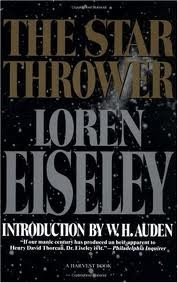 In a 2010 essay written for the magazine PopMatters, Michael Antman considers aspects of Eiseley that emerge from The Star Thrower collection.
In a 2010 essay written for the magazine PopMatters, Michael Antman considers aspects of Eiseley that emerge from The Star Thrower collection.
Antman is struck not only by Eiseley’s writing but by what that writing was not:
Because his writing is so steeped in knowledge of the natural world and the humility that this knowledge inevitably engenders, he almost never slides into the lecturing, fire-and-brimstone mode so dominant among the science preachers, er, writers of our era. (Eisley died in 1977.) There is nothing political here, none of the typically insincere hyperbole about the fate of our planet if we don’t do precisely what the intellectual fashion of the moment tells us we ought to do, and no excoriations of our short-sighted politicians and policy-makers (though they are, of course, short-sighted.) As an authority on evolution, Eiseley’s view extends across aeons. “I have been steeped in geological eras”; he writes, ”my mind is filled with the osseous debris of a hundred graveyards.”
In his review, Antman also sees us at a pivotal moment, foreshadowed by Eiseley before “climate change” had entered popular parlance. He urges readers to seek out The Star Thrower, if only to
. . .immerse yourself in the wisdom of one who didn’t believe in wisdom, but who understood at least that we are straddling a pivotal point in human history between the end of one long and painful eon and the beginning of an uncertain other.
